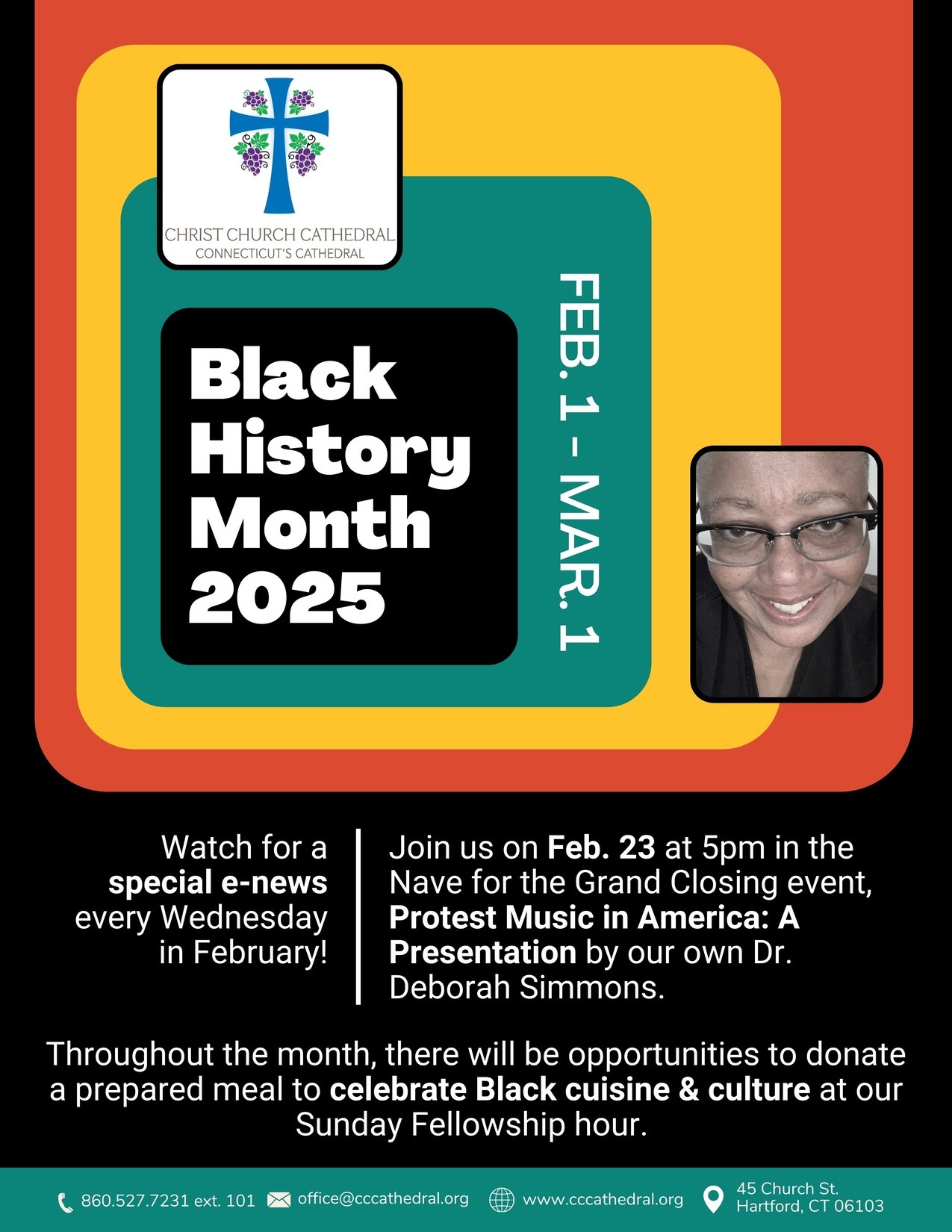Dear Beloved Cathedral Community,
As we step into February, we invite you to join us in a special month of celebration, reflection, and learning as we honor Black History Month at Christ Church Cathedral This annual observance is a time to lift up the rich heritage, achievements, and contributions of Black individuals and communities—both past and present—who have shaped our faith, our society, and our shared journey toward justice and reconciliation.
This year’s observance features special weekly e-news with engaging articles, cultural insights, and varied resources. We will rejoice in enjoying delicious cuisine and will offer a powerful closing event designed to deepen our understanding and commitment to justice.
On February 23rd at 2:00 p.m., the special event, featuring our own, Dr. Deborah A. Simmons, Ed. D, a professor of Music at CT State- Manchester, 🎶 Protest Music in America – A Presentation is a compelling exploration of protest music in American history, a powerful force in movements for justice and social change. Dr. Simmons will guide us through the ways music has shaped and amplified the voices of those fighting for equality, dignity, and liberation.
Black History Month is not just a time for remembrance, it is an opportunity to grow in our understanding, strengthen our commitment to justice, and celebrate the incredible resilience and contributions of the Black community.
More information about signing up to contribute a meal for Fellowship Hour for the last three weeks in February will be provided on Sunday, February 2nd.
May this month be a time of reflection, joy, and renewed commitment to the Gospel values of love, justice, and unity.
With gratitude and hope,
Lina+
The Very Rev. Miguelina Howell, Cathedral Dean

About Black History Month
By Kay Boatner for National Geographic Kids: Black History Month
Every February, people in the United States celebrate the achievements and history of African Americans as part of Black History Month.
HOW IT STARTED
In 1915, in response to the lack of information on the accomplishments of Black people available to the public, historian Carter G. Woodson co-founded the Association for the Study of Negro Life and History. In 1926, the group declared the second week of February as “Negro History Week” to recognize the contributions of African Americans to U.S. history. Few people studied Black history and it wasn't included in textbooks prior to the creation of Negro History Week.
This week was chosen because it includes the birthdays of both Frederick Douglass, an abolitionist (someone who wanted to end the practice of enslaving people), and former U.S. president Abraham Lincoln. President Lincoln led the United States during the Civil War, which was primarily fought over the enslavement of Black people in the country. Many schools and leaders began recognizing the week after its creation.
The week-long event officially became Black History Month in 1976 when U.S. president Gerald Ford extended the recognition to “honor the too-often neglected accomplishments of Black Americans in every area of endeavor throughout our history.” Black History Month has been celebrated in the United States every February since.
WHAT IT HONORS
Black History Month was created to focus attention on the contributions of African Americans to the United States. It honors all Black people from all periods of U.S. history, from the enslaved people first brought over from Africa in the early 17th century to African Americans living in the United States today.
Among the notable figures often spotlighted during Black History Month are Dr. Martin Luther King, Jr., who fought for equal rights for Blacks during the 1950s and ’60s; Thurgood Marshall, the first African-American justice appointed to the United States Supreme Court in 1967; Mae Jemison, who became the first female African-American astronaut to travel to space in 1992; and Barack Obama, who was elected the first-ever African-American president of the United States in 2008.